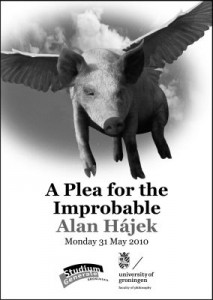“Much of my philosophical research has concerned the extremely improbable: events that we typically disregard because their probabilities are so low. And yet many such events should be important to philosophers, some of them should be important to scientists, and some of them should be important to all of us.”
“Extremely improbable events, like being struck by lightning, are typically disregarded or not taken seriously, because their probabilities are so low. However, one could argue that probability is not about odds, but about the belief in an existence of an alternative outcome. The chance of winning the lottery for example is extremely improbable. Nevertheless, people still buy tickets with the notion that it is a relatively small price to pay for considering the amount you can win. Does this logic work or are we fooling ourselves?” (Groningen Lecture)

